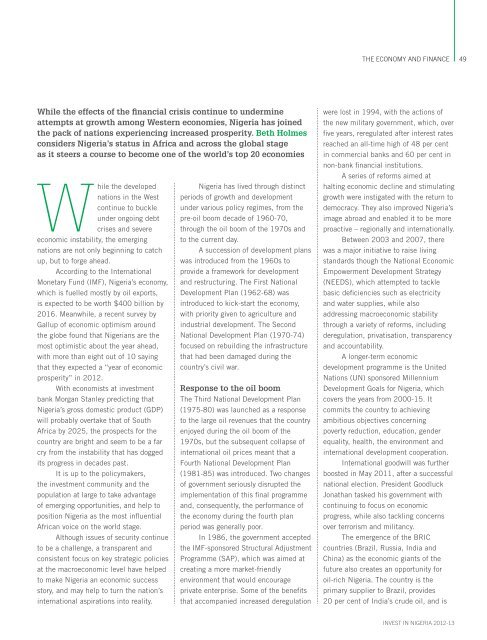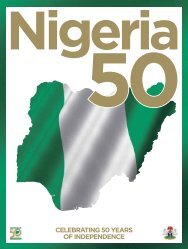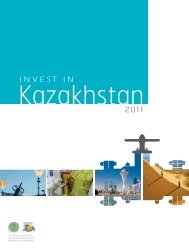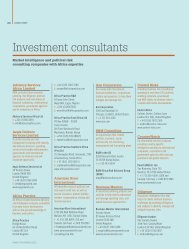NIGERIA Invest in 2012-13 - Newsdesk Media
NIGERIA Invest in 2012-13 - Newsdesk Media
NIGERIA Invest in 2012-13 - Newsdesk Media
Create successful ePaper yourself
Turn your PDF publications into a flip-book with our unique Google optimized e-Paper software.
While the effects of the f<strong>in</strong>ancial crisis cont<strong>in</strong>ue to underm<strong>in</strong>e<br />
attempts at growth among Western economies, Nigeria has jo<strong>in</strong>ed<br />
the pack of nations experienc<strong>in</strong>g <strong>in</strong>creased prosperity. Beth Holmes<br />
considers Nigeria’s status <strong>in</strong> Africa and across the global stage<br />
as it steers a course to become one of the world’s top 20 economies<br />
While the developed<br />
nations <strong>in</strong> the West<br />
cont<strong>in</strong>ue to buckle<br />
under ongo<strong>in</strong>g debt<br />
crises and severe<br />
economic <strong>in</strong>stability, the emerg<strong>in</strong>g<br />
nations are not only beg<strong>in</strong>n<strong>in</strong>g to catch<br />
up, but to forge ahead.<br />
Accord<strong>in</strong>g to the International<br />
Monetary Fund (IMF), Nigeria’s economy,<br />
which is fuelled mostly by oil exports,<br />
is expected to be worth $400 billion by<br />
2016. Meanwhile, a recent survey by<br />
Gallup of economic optimism around<br />
the globe found that Nigerians are the<br />
most optimistic about the year ahead,<br />
with more than eight out of 10 say<strong>in</strong>g<br />
that they expected a “year of economic<br />
prosperity” <strong>in</strong> <strong>2012</strong>.<br />
With economists at <strong>in</strong>vestment<br />
bank Morgan Stanley predict<strong>in</strong>g that<br />
Nigeria’s gross domestic product (GDP)<br />
will probably overtake that of South<br />
Africa by 2025, the prospects for the<br />
country are bright and seem to be a far<br />
cry from the <strong>in</strong>stability that has dogged<br />
its progress <strong>in</strong> decades past.<br />
It is up to the policymakers,<br />
the <strong>in</strong>vestment community and the<br />
population at large to take advantage<br />
of emerg<strong>in</strong>g opportunities, and help to<br />
position Nigeria as the most <strong>in</strong>fluential<br />
African voice on the world stage.<br />
Although issues of security cont<strong>in</strong>ue<br />
to be a challenge, a transparent and<br />
consistent focus on key strategic policies<br />
at the macroeconomic level have helped<br />
to make Nigeria an economic success<br />
story, and may help to turn the nation’s<br />
<strong>in</strong>ternational aspirations <strong>in</strong>to reality.<br />
Nigeria has lived through dist<strong>in</strong>ct<br />
periods of growth and development<br />
under various policy regimes, from the<br />
pre-oil boom decade of 1960-70,<br />
through the oil boom of the 1970s and<br />
to the current day.<br />
A succession of development plans<br />
was <strong>in</strong>troduced from the 1960s to<br />
provide a framework for development<br />
and restructur<strong>in</strong>g. The First National<br />
Development Plan (1962-68) was<br />
<strong>in</strong>troduced to kick-start the economy,<br />
with priority given to agriculture and<br />
<strong>in</strong>dustrial development. The Second<br />
National Development Plan (1970-74)<br />
focused on rebuild<strong>in</strong>g the <strong>in</strong>frastructure<br />
that had been damaged dur<strong>in</strong>g the<br />
country’s civil war.<br />
Response to the oil boom<br />
The Third National Development Plan<br />
(1975-80) was launched as a response<br />
to the large oil revenues that the country<br />
enjoyed dur<strong>in</strong>g the oil boom of the<br />
1970s, but the subsequent collapse of<br />
<strong>in</strong>ternational oil prices meant that a<br />
Fourth National Development Plan<br />
(1981-85) was <strong>in</strong>troduced. Two changes<br />
of government seriously disrupted the<br />
implementation of this f<strong>in</strong>al programme<br />
and, consequently, the performance of<br />
the economy dur<strong>in</strong>g the fourth plan<br />
period was generally poor.<br />
In 1986, the government accepted<br />
the IMF-sponsored Structural Adjustment<br />
Programme (SAP), which was aimed at<br />
creat<strong>in</strong>g a more market-friendly<br />
environment that would encourage<br />
private enterprise. Some of the benefits<br />
that accompanied <strong>in</strong>creased deregulation<br />
the economy and f<strong>in</strong>ance 49<br />
were lost <strong>in</strong> 1994, with the actions of<br />
the new military government, which, over<br />
five years, reregulated after <strong>in</strong>terest rates<br />
reached an all-time high of 48 per cent<br />
<strong>in</strong> commercial banks and 60 per cent <strong>in</strong><br />
non-bank f<strong>in</strong>ancial <strong>in</strong>stitutions.<br />
A series of reforms aimed at<br />
halt<strong>in</strong>g economic decl<strong>in</strong>e and stimulat<strong>in</strong>g<br />
growth were <strong>in</strong>stigated with the return to<br />
democracy. They also improved Nigeria’s<br />
image abroad and enabled it to be more<br />
proactive – regionally and <strong>in</strong>ternationally.<br />
Between 2003 and 2007, there<br />
was a major <strong>in</strong>itiative to raise liv<strong>in</strong>g<br />
standards though the National Economic<br />
Empowerment Development Strategy<br />
(NEEDS), which attempted to tackle<br />
basic deficiencies such as electricity<br />
and water supplies, while also<br />
address<strong>in</strong>g macroeconomic stability<br />
through a variety of reforms, <strong>in</strong>clud<strong>in</strong>g<br />
deregulation, privatisation, transparency<br />
and accountability.<br />
A longer-term economic<br />
development programme is the United<br />
Nations (UN) sponsored Millennium<br />
Development Goals for Nigeria, which<br />
covers the years from 2000-15. It<br />
commits the country to achiev<strong>in</strong>g<br />
ambitious objectives concern<strong>in</strong>g<br />
poverty reduction, education, gender<br />
equality, health, the environment and<br />
<strong>in</strong>ternational development cooperation.<br />
International goodwill was further<br />
boosted <strong>in</strong> May 2011, after a successful<br />
national election. President Goodluck<br />
Jonathan tasked his government with<br />
cont<strong>in</strong>u<strong>in</strong>g to focus on economic<br />
progress, while also tackl<strong>in</strong>g concerns<br />
over terrorism and militancy.<br />
The emergence of the BRIC<br />
countries (Brazil, Russia, India and<br />
Ch<strong>in</strong>a) as the economic giants of the<br />
future also creates an opportunity for<br />
oil-rich Nigeria. The country is the<br />
primary supplier to Brazil, provides<br />
20 per cent of India’s crude oil, and is<br />
<strong>in</strong>vest <strong>in</strong> niGeRia <strong>2012</strong>-<strong>13</strong>







